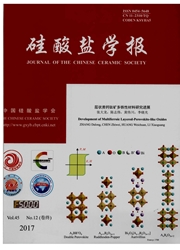

 中文摘要:
中文摘要:
通过硬石膏水化率、水化温度、液相离子浓度测定和硬化体显微结构分析,研究了Na2SO4对硬石膏水化进程和二水石膏晶体形貌的影响,从二水石膏晶体生长角度探讨了Na2SO4的作用机理。结果表明:Na2SO4可促进硬石膏溶解,使硬石膏水化率提高,水化热集中,水化潜伏期缩短,水化进程加快;Na2SO4还可提高二水石膏的析晶过饱和度,使二水石膏临界晶核半径减少,晶体成核与生长速率加快,晶体尺寸减小;Na2SO4形成富SO4^2-液相,有利于二水石膏晶体结构基元形成,高SO4^2-浓度改变了晶面在不同轴向生长的相对速率,使c轴方向的生长具有优势,从而改变了二水石膏晶体生长习性,使二水石膏晶体由板状变为针柱状。
 英文摘要:
英文摘要:
The influence of sodium sulfate on the anhydrite hydration process and the crystal morphology of its dihydrate products were studied by the determination of the hydration rate, hydration temperature and the ion concentration in liquid phase, in combination with the investigation of the microstructure of the hardened anhydrite paste. Moreover, the activation mechanism of sodium sul- fate was analyzed from the view of the crystal growth of dihydrate gypsum. The results show that the addition of sodium sulfate promotes the dissolution of anhydrite, increases its hydration rate, concentrates its hydration heat evolution, shortens the hydration latency period, and thus accelerates the hydration process. On the other hand, the addition of sodium sulfate increases the supersaturation degree of dihydrate gypsum crystallization, decreases the critical nucleus radius of the gypsum crystal, and accelerates its crystal nucleation and growth, consequently leading to the refinement of the crystal size. The liquid environment rich in SO4^2- produced by adding sodium sulfate is beneficial for the formation of crystal structure units of dihydrate gypsum. Furthermore, high SO4^2- concentration changes the relative growth rate of the crystal face in different axials, promotes the preferential growth in the c-axis direction, and thus changes the growth behavior of the gypsum crystal, leading to the transformation of the crystal morphology from tabular to columnar.
 同期刊论文项目
同期刊论文项目
 同项目期刊论文
同项目期刊论文
 期刊信息
期刊信息
